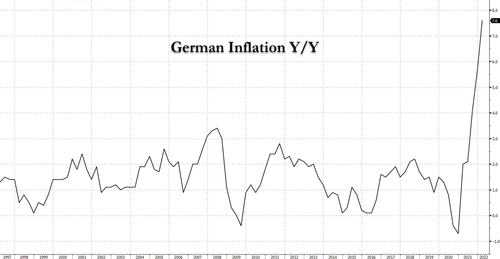Authored by MN Gordon via EconomicPrism.com,
Central Bank Digital Currencies (CBDC) are coming. And they’re coming much faster than most people care to think about. Are you ready?
At the moment, roughly 90 central banks – including the European Central Banks and the Federal Reserve – are either experimenting with, or are in varying stages of CBDC implementation. Moreover, these CBDC friendly central banks include all G20 economies. And together, represent more than 90 percent of global GDP.
What’s important to understand is the adoption of a CBDC in your country of residence would accompany the abolition of cash. This would be for your own good, of course. To eliminate nefarious transactions and black markets.
If you value financial privacy and the liberty to spend your money as you please, then the rapidly approaching rollout of CBDCs is a major red flag. Compulsory use of a CBDC, like a digital dollar for example, would give central planners complete oversight and control over your finances.
You see, under a CBDC regime – free of cash – all of your transactions would be subject to government surveillance. All remnants of financial freedom, privacy, and anonymity would be destroyed. But that’s not all…
CBDCs would allow control freak, power mad central planners to do much more than spy and surveil your financial transactions. CBDCs would allow them to control how and when you spend your money.
This may sound crazy to a sane person, who operates with a modicum of modesty and integrity. But, in truth, this is one of the main intents of CBDCs. In fact, several years ago Bank for International Settlements General Manager Agustin Carstens outlined the extraordinary powers CBDCs would afford central planners. Here are the particulars from Carstens himself:
“There is a huge difference [between CBDC and cash]. For example, with cash we don’t know who’s using a 100 dollar bill today. We don’t know who’s using a 1,000 peso bill today. A key difference with the CBDC is the central bank will have absolute control under rules and regulations that will determine the use of that expression of central bank liability, and we will have the technology to enforce that.”
Do you get it? The central planners want absolute control over how you spend your money. This includes the U.S. government too…

Traceable And Programmable
On March 9, the Biden administration released an executive order (EO) requiring several federal agencies to study digital currencies and to identify ways to regulate them. A big part of the EO is focused on blockchain based cryptocurrencies like bitcoin and ethereum.
However, within the EO, Biden also directs the federal government and Federal Reserve to lay the foundation for a potential new U.S. currency, a CBDC – perhaps, a digital dollar.
Specifically, the EO directs the U.S. Treasury, and other federal agencies, to study the development of the new CBDC and report back within 180 days of the potential risks and benefits of a digital dollar. The EO also directs the Treasury Department, Office of the Attorney General and Federal Reserve to produce a ‘legislative proposal’ to create a digital currency within 210 days, about seven months.
The digital dollar is coming, and it’s coming quick.
To be clear, the adoption of a digital dollar by the U.S. government, as Biden intends, would be one of the greatest expansions of federal power ever made. The digital dollar would be much different than a digital version of the existing U.S. dollar. It would also be much different than cryptocurrencies like bitcoin and ethereum, which are decentralized.
Digital dollars would be traceable and programmable. The Federal Reserve, or some other government agency, would have the ability to create digital dollars at whim. Moreover, the digital dollars could be programmed to have various rules and restrictions governing how and when they are spent.
Earlier this year, in Federal Reserve published report about the development of a CBDC, the Fed provided examples of possible ‘design choices’ for a digital dollar, including that “a central bank might limit the amount of CBDC an end user could hold.”
Biden’s EO plan for a digital dollar also includes design choices that will give the federal government total control over financial freedom and the economy. The EO even states the CBDC and other policies governing digital assets must mitigate “climate change and pollution” and promote “financial inclusion and equity.” This is a major focus.
From this, we can speculate that financial inclusion and equity means wealth redistribution. And climate change mitigation means restrictions to fossil-fuel use. These, and other government dictates, like the direct subtraction of taxes and fees from your account, would be programmed into the digital dollar.
Why now…
Blowback
U.S. and European Union sanctions against Russia, including cutting Russian financial institutions off from SWIFT and preventing the Russian Central Banks from using its foreign currency reserves, may prove to be a strategic blunder. The blowback potential is real, and is already happening.
Europe, which depends on Russia for 40 percent of its natural gas, is now reaping the whirlwind. According to Bloomberg, Putin has signed a decree demanding payment in rubles for Russian gas supplies starting April 1 (today). Will Europe submit?
There are rumors European nations are already covertly buying rubles. The ruble’s increase on the foreign exchange market to pre-invasion levels certainly hints something is in the works.
Regardless, the U.S. is losing control over the international financial and payment system. By freezing Russia out SWIFT, Putin is being forced to look for other alternatives. Specifically, China has been developing its own Cross-Border Interbank Payment System (CIPS) as an alternative to SWIFT.
Sanctions against Russia may further accelerate the use and adoption of CIPS by nations that are opposed to western influence. Cryptocurrencies and blockchain technology also offer banks and individuals ways to move payments without using dollars or SWIFT.
The very success of the weaponization of the legacy financial system by the U.S. and Europe is driving Russia and others into such alternatives. Hence, fewer international transactions in dollars could undermine the dollar’s reserve currency status. This would have serious implications for the U.S. economy, as the dollar would likely suffer a significant devaluation.
In the U.S. consumer price inflation (official) is already at a 40 year high. Unofficially, it’s higher than it has been in over 100 years.
Between the financial war being waged, raging consumer price inflation, a $30 trillion national debt, trillion dollar deficits, and unfunded liabilities running into the hundreds of trillions, something’s got to give…
…namely, the U.S. dollar.
Countdown to U.S. Government Default
The popular American myth is that the U.S. government has never defaulted on its debt.
Quite frankly, that’s unadulterated hogwash.
The U.S. government has (unofficially) defaulted on its debt twice within the last hundred years.
Executive Order 6102 of 1933, which forced all American citizens to turn in gold coins and bars, was, in fact, a default. Gold ownership in the United States, with some small limitations, was illegal for the next 40 years.
Under EO 6102, Americans were compensated $20.67 per troy ounce of gold. They were paid with paper dollars. Immediately following the government’s gold confiscation, the price of gold was raised by the Gold Reserve Act of 1934 to $35 per ounce. Just like that, American citizens were robbed of over 40 percent of their wealth.
The second default occurred in 1971, when President Nixon “temporarily” suspended the convertibility of the dollar into gold.
Prior to 1971, as determined by the Bretton Woods international monetary system, which was agreed to in Bretton Woods, New Hampshire, in July 1944, a foreign bank could exchange $35 with the U.S. Treasury for one troy ounce of gold. After the U.S. reneged on this established exchange rate, when foreign banks handed the U.S. Treasury $35, they received $35 in exchange.
In both instances, the U.S. government didn’t overtly default on the debt. Instead, it changed the fundamentals – the terms and conditions – of the dollar. By all honest accounts, these are defaults.
Similarly, the issuance of a digital dollar (a Fed issued CBDC), which is traceable and programmable, changes the terms and conditions of the cash dollar.
Make no mistake. This is a default…and you won’t like it.
Moreover, per Biden’s EO, this default could happen as soon as T-minus 210 days from March 9 – or as soon as October 4th.
If that doesn’t give you a warm and fuzzy, we don’t know what will.
* * *
The window to protect your wealth and financial privacy is closing. And it’s closing quick. I don’t like it one bit. But I’m not going to stand around powerless as Washington’s control freak sociopaths destroy everything I’ve worked so hard for. For this reason, I’ve dedicated the past 6-months to researching and identifying simple, practical steps everyday Americans can take to protect their wealth and financial privacy. The findings of my work are documented in the Financial First Aid Kit. If you’d like to find out more about this important and unique publication, and how to acquire a copy, stop by here today!]







